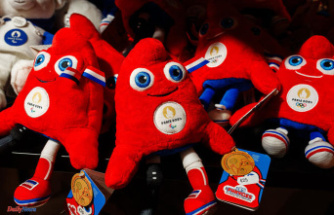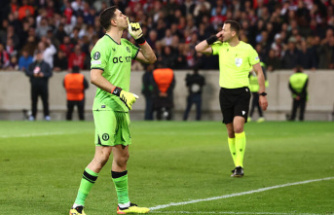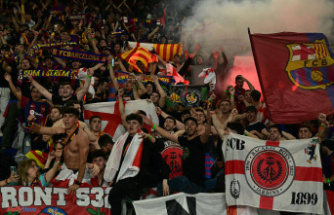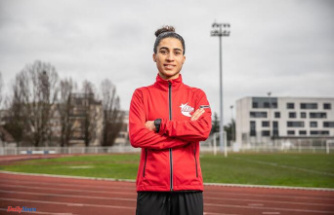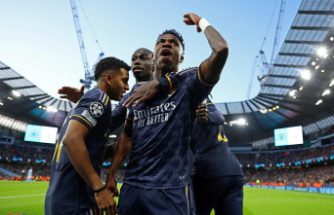In the afternoon, the German national team starts the World Cup tournament. Their first game takes place at Khalifa International Stadium, a stadium of shame. There were many human rights violations during construction - and one death. What workers report is frightening.
Again flames will shoot up around the oversized World Cup on the lawn, again the light show will go haywire. Just like before every World Cup game in Qatar. Again western pop music will be so deafening, so loud that - this seems to be the plan of Qatar and FIFA - the fans will hear the suffering and the screams of those who suffered for this mega event and the place where the Face players, have built up, no longer hear.
But when the German national team starts the tournament at 2 p.m. (ARD and in the live ticker on ntv.de) in the Khalifa International Stadium, they are playing in a stadium of shame and blood. "Workers employed at the Khalifa International Stadium reported similar violations as workers at the other seven stadiums," Namrata Raju, the India director and labor expert at the human and labor rights organization Equidem, told ntv.de.
The human and labor rights organization fights for the rights of marginalized communities and exposes injustices with teams of experts and investigators on the ground. This is also the case in Qatar, where Equidem, together with workers, carried out an 18-month investigation in the eight World Cup stadiums. Indians make up the largest number of migrant workers in Qatar.
The investigation team found that during the construction of Khalifa Stadium, "discrimination based on nationality, wage theft - particularly unpaid overtime, non-payment of severance pay - and overwork" were the most common violations, according to Raju. In addition to these problems, workers from the Khalifa "claimed that they had paid illegal recruitment fees that would normally have to be paid by the employer". In addition, workers there were "generally affected by a culture of fear in the workplace."
According to the labor expert, the "most disturbing observations" of the investigation were "the workers' overwhelming fear of reprisals". They feared this above all "when they talk about their experiences". Accordingly, the name of the investigation is: "If we complain, we are fired".
It lists the following additional violations for Khalifa Stadium: psychological harm, such as threats, stress and fear cultures; obstacles to professional advancement; health and safety risks; Exposure to Covid-19; retaliation for reporting violations; no possibility of changing employers.
The testimony of a Bangladeshi worker from the Khalifa construction site reads as follows: "I only got overtime for the first year. After that they refused to pay overtime and deducted it from our wages for various reasons. In the end we got less than our contracts said. When independent auditors came, they showed them payslips, showing that they properly paid us for overtime and other extras."
India Director Raju acknowledges that Qatar has introduced a number of labor reforms "which represent a positive outcome". However, the Equidem study shows "that the reality on the ground is different and workers really have no voice". This coincides with the research of other human rights organizations such as Human Rights Watch or Amnesty International. Unions, for example, are banned in Qatar.
At least one worker died working at Khalifa Stadium. His name was Zac Cox, an Englishman. In January 2017, he fell 40 meters off a rope while installing a catwalk. At the time, the coroner said at the UK inquest that "many managers knew" they were "requiring a group of their workers to rely on potentially lethal equipment" and changes had been made to speed up the work so that the Stadium would be ready in time for the World Cup, which was "chaotic, unprofessional, thoughtless and downright dangerous".
Cox is one of only three dead workers that Qatar officially recognizes as a work-related death in relation to the World Cup. Overall, according to Equidem, the Supreme Committee reports only 37 deaths among migrant workers. Human rights organizations strongly disagree with this information, they count thousands dead.
However, according to Raju, the greater concerns of the human rights community "relate to the fact that there is no real transparency regarding the welfare of workers and workers are still working in conditions such as extreme heat that have negative health effects and even lead to can lead to death." According to the expert, this overall situation, in which reforms only exist on paper, "but in practice companies do not respect the fundamental right of employees to life", is "unsustainable".
When the DFB team steps onto the pitch in the afternoon and the fight for the world title begins, Raju wants to "remind the national team that their voice counts". The DFB should keep asking FIFA to "compensate" the workers because many of them still have "payments outstanding from their companies" and "live in poverty". The workers also need a “platform to speak up without fear of reprisals”. The DFB-Elf should also put pressure on "a center for migrant workers so that workers have a space where they can talk about their experiences without having this overwhelming fear".
"One Love" will not only be on Manuel Neuer's arm in the Khalifa Stadium. The captain's armband would not have made up for the suffering of the workers who built the arena either. That is not possible, but FIFA and Qatar can avoid additional suffering if they finally act. Even if the music will probably be much too loud for that.


